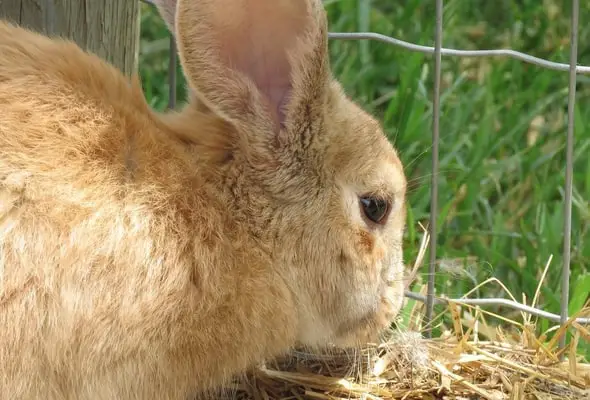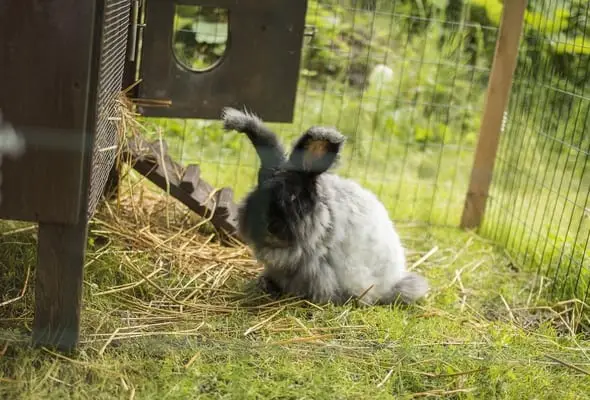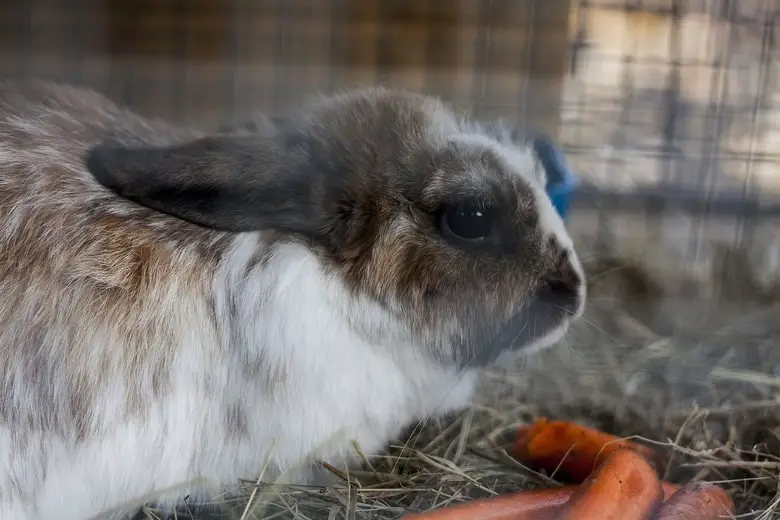Whether cottontails, dwarf, or lop-eared, rabbits make adorable pets. While dwarf rabbits’ size and vulnerability certify them as an indoor variety, the average cottontail or lop-eared bunny can be kept in an outdoor pen.
Many concerned bunny owners have observed a habit their pets have of chewing on their hutch, causing potentially dangerous damage to their enclosures. This raises the question, can rabbits chew through chicken wire?
Can Rabbits Chew Through Chicken Wire?
Due to a rabbit’s durable and sharp teeth, they do have the capability of chewing through chicken wire. Rabbits can also chew through plastic, vinyl, and solid wood.
Rabbits have six incisors, consisting of two on the top, two on the bottom, and two hidden ‘peg teeth’. Peg teeth refer to tiny teeth positioned directly behind the upper incisors. Rabbits also possess twenty-two ‘cheek teeth’.
The rabbit’s unusual array of teeth evolved to enable them to chew through the vegetation that forms the basis of their diets in the wild. Rabbits’ teeth have another curious characteristic; they have open roots that enable them to grow constantly, lengthening by three to five inches each year.
While this trait serves them well in the wild, where the roughage they consume quickly wears their teeth, it can be quite problematic for rabbits that live their lives in domestication. As most pet rabbits consume pellets, their ever-growing teeth are not afforded the chance to wear out.
A rabbit needs an outlet for grinding its chompers, and the obvious solution to the enclosed bunny is to chew their way through the wires you’ve lovingly installed for their protection.
Why Is My Rabbit Chewing Chicken Wire?
There are many reasons they may be chewing the chicken wire of their enclosure, but the first is their instinctive compulsion to grind their teeth down on anything and everything they can.

If the food they consume is not sufficiently gritty, they will compensate in other ways.
Another cause of enclosure chewing is boredom. Many prospective owners assume rabbits are self-contained, but this isn’t the case. In actuality, it is highly recommended that you keep rabbits in pairs so that they always have a playmate.
If this isn’t feasible, evidence suggests you should spend at least half an hour a day giving your bunny your full attention.
This one on one time, providing your rabbit with plenty of stimulating toys, and ensuring they have ample space to run and play are all key to alleviating boredom. In addition to destructive chewing, bored rabbits often dig excessively and use their bodies to push and rattle against the confines of their pens.
Is Chicken Wire Safe for Rabbits?
Chicken wire is mesh fencing made up of galvanized wire. Galvanization is the technique of applying a protective zinc coating to steel or iron in order to prevent rusting.

While it is unlikely that your rabbit will suffer any adverse health effects from chewing chicken wire once or twice, it is a practice that should be actively discouraged.
While chicken wire has many purposes, it is too insubstantial and easily broken to be appropriate as a rabbit enclosure. If utilized at all, it should be used in conjunction with another material, such as welded wire mesh.
The optimal type of wire for hutches is 14-gauge woven in 1-by-2-inch mesh. This variety is tightly wound enough to prevent your rabbits head or any of their limbs from becoming stuck and is sturdy enough to withstand their chewing.
How Can I Stop My Rabbit From Chewing Chicken Wire?
There are several methods for addressing a destructive chewing habit in your rabbit. The first step is to acknowledge and understand that your rabbit cannot help chewing; as we have previously clarified, it is part of how they keep their constantly growing teeth at a comfortable length.
If your rabbit is chewing the wire of their enclosure, it is helpful to procure a variety of safe and chewable items. These can include toys, branches from apple or willow trees, untreated grass mats, and even bits of cardboard.
Additionally, there is the aforementioned issue of boredom. A bored rabbit’s destructive tendencies will quickly get out of control. It is important to ascertain whether your bunny has enough room in their enclosure to run and play, as a cooped-up rabbit is an unhappy rabbit.
Some rabbit hutches come with attached runs to mitigate this issue, or you can attach a run to an existing hutch.
As we’ve mentioned previously, it is advisable that pet rabbits be kept in pairs or more. If it isn’t feasible to add another rabbit to the family, anecdotal evidence suggests playing and interacting with your rabbit for at least a half hour every day.
Another suggestion is to make your rabbit’s daily life more stimulating. Scattering or hiding food around their hutch encourages their instinctive foraging behavior and keeps them mentally and physically engaged.
What Can Rabbits Chew On for Their Teeth?
There are many things rabbits can chew on that will help alleviate the discomfort of their growing teeth, and preserve the wire of their hutches.
A unanimous recommendation from experts is hay. Oat hay, timothy, and orchard grass hay are all appropriate, and it is advised that you replace the hay at least twice a day.
Other items that are safe and suitable for your rabbit’s teeth are apple, willow and aspen branches, pine firewood, cotton towels, untreated pine lumber, and compressed alfalfa cubes. You cannot stop a rabbit from chewing, nor should you, but you can provide them suitable choices.
Conclusion
Round-the-clock chewing is a reality of rabbit ownership. Wild rabbits evolved to have teeth that were constantly growing and renewing themselves, as the fibrous matter of their natural diets would break their teeth down.
Domestic rabbits usually consume much gentler fare, but the innate drive to grind their teeth down is still present. Rabbits who are not given a choice of appropriate chew items, or who are bored or unstimulated, will often take to chewing their cages and enclosures, including those made of chicken wire.

